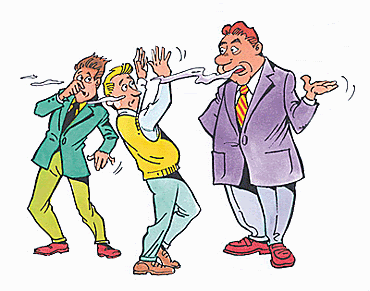Dogs Bad Breath
Cure Your Bad Breath In 3 Days, Click Here To Know More
>> Click Here To Know The Symptoms, Causes & Effective Cures For Bad Breath <<
A dogs bad breath usually has basically the same cause as bad breath in humans: anaerobic bacteria break down proteins in the dog's mouth and release volatile sulfur compounds (VSC), which smell like rotten eggs. These bacteria live in airless pockets in the back of the mouth, between the teeth and the gums and on the back of the tongue. In dogs more often than humans, however, the worst problem lies with a layer of tartar on the teeth.
Tartar is made up of mineral deposits, bits of food, and live bacteria: if you could magnify the tartar on a dog's teeth, you would be able to see that it is actually very rough with numerous hollows and cavities where bacteria can live, digesting the little bits of food that are caught there as well. When the tartar is very advanced, it extends beyond the gum line, creating ideal conditions for the proliferation of bacteria that flourish in the absence of oxygen. This is often the source of halitosis in dogs, and because older dogs often have a considerable buildup of tartar, dogs bad breath is particularly associated with elderly dogs.
It's best to try to prevent halitosis in dogs by avoiding the troublesome buildup of tartar in the first place. There are several ways to do this: get into the habit of brushing your dog's teeth when the dog is very young - toothpastes are available especially for dogs and cats that contain enzymes to break down the tartar and prevent it from advancing. Take your dog to the veterinarian regularly and have his or her teeth professionally examined. Dental cleaning is available to clear away accumulating tartar before it gets too bad. You can also purchase a variety of chew toys and bones that help dogs scrape the tartar off their own teeth while they are chewing. If you do all of these things, you should be able to avoid dogs bad breath.
If tartar is already a problem, and you are starting to notice your dogs bad breath, you will probably find yourself paying for an extensive cleaning, probably under general anesthetic, by the veterinarian. There is some risk involved when the dog is old, but heavy tartar on the teeth comes with high risk of health complications anyway, so in most cases, it is worth taking a chance. Aside from improving your pet's health, the procedure is effective at putting an end to severe halitosis in dogs.
R. Drysdale is a freelance writer with more than 25 years experience as a health care professional. She is a contributing editor to Bad Breath Cure, a blog dedicated to the treatment of bad breath.
Labels: bad_breath_chronic_cure, bad_breath_healthcomplications.com, bad_breath_rid, bad_breath_stop, bad_breath_toddler

